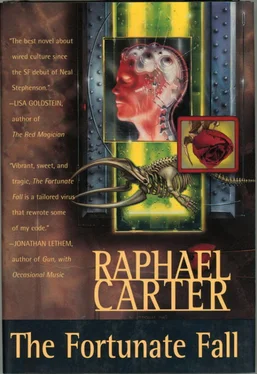Raphael Carter - The Fortunate Fall
Здесь есть возможность читать онлайн «Raphael Carter - The Fortunate Fall» весь текст электронной книги совершенно бесплатно (целиком полную версию без сокращений). В некоторых случаях можно слушать аудио, скачать через торрент в формате fb2 и присутствует краткое содержание. Город: New York, Год выпуска: 1996, ISBN: 1996, Издательство: Tor Books, Жанр: Киберпанк, на английском языке. Описание произведения, (предисловие) а так же отзывы посетителей доступны на портале библиотеки ЛибКат.
- Название:The Fortunate Fall
- Автор:
- Издательство:Tor Books
- Жанр:
- Год:1996
- Город:New York
- ISBN:0-312-86034-X
- Рейтинг книги:3 / 5. Голосов: 1
-
Избранное:Добавить в избранное
- Отзывы:
-
Ваша оценка:
- 60
- 1
- 2
- 3
- 4
- 5
The Fortunate Fall: краткое содержание, описание и аннотация
Предлагаем к чтению аннотацию, описание, краткое содержание или предисловие (зависит от того, что написал сам автор книги «The Fortunate Fall»). Если вы не нашли необходимую информацию о книге — напишите в комментариях, мы постараемся отыскать её.
“Gripping…. One of the most promising SF debuts in recent years”.
—“Publisher’s Weekly” starred review
The Fortunate Fall — читать онлайн бесплатно полную книгу (весь текст) целиком
Ниже представлен текст книги, разбитый по страницам. Система сохранения места последней прочитанной страницы, позволяет с удобством читать онлайн бесплатно книгу «The Fortunate Fall», без необходимости каждый раз заново искать на чём Вы остановились. Поставьте закладку, и сможете в любой момент перейти на страницу, на которой закончили чтение.
Интервал:
Закладка:
“I assure you I am unmistakable. I look forward to our conversation, Maya Tatyanichna. Now if you will excuse me.”
“Until tomorrow, then.”
“Tomorrow.” He looked up, toward where the rest of Keishi’s body towered over me. “Good-bye, elephant. Such an oddity—an elephant raised by wolves.”
“Yeah, same to you, buddy.”
“Keishi!”
But perhaps he did not even hear her; he had already moved away, the blimp swiftly reeling in the dwarf as he receded. A single grouper, streaming toward us from the dwarf’s direction, was about to overtake us—
Then I was back sitting in my living room. Rather than swim back to where we’d started, Keishi had simply pulled the plug.
It always takes me a long time to recover from going into gray-space. The parts of your brain that get copied into grayspace aren’t silenced, they’re just cut off from the rest of the brain. Isolated, they dream; and though the myrmichor overwrites the dream, there’s always something that remains, just out of reach. I can’t help trying to grasp it, though it always slips through my fingers.
Keishi, however, was awake at once. “What an asshole!” she said.
“I think he’ll be all right,” I said when I felt whole again. “He’s got presence—it’s a strange kind, but he’s got it. If I could feel it even in grayspace, it should come through beautifully in the Net-cast. This could work out.”
“Well, if he screens well, he screens well. There’s no arguing with that,” she said grudgingly. “He’s still an asshole,” she confided to the vidphone. Then she inclined her head and said slyly, “Have you thought any more about—”
“You know,” I interrupted, “you can’t keep doing this forever.”
“What?”
“I know you think now that you’ve got something on me, you can do anything you want. And you’re right, there’s nothing I can do. But sooner or later, News One’s going to catch on.”
She rested her elbow on nothing and leaned her head against her hand. “Haven’t we had this conversation already? At least once? It’s like a bad video game: if you leave the castle and go back in, the Guardians are resurrected and you have to fight your way through all over again. I thought we established that I’m not a cop, or a spy, or a blackmailer. I thought we’d finally reached some understanding—”
“Of what? Of what you showed me yesterday? What does that have to do with disrupting my interviews?”
“Oh,” she said. “That’s what you mean.” Her image shrugged; the Word scrolled down from treachery to flame. “ It’s a whole different etiquette in grayspace, Maya. People always insult each other—it’s practically impolite not to. I mean, it worked, didn’t it? You got your interview. I can’t always explain everything. Sometimes I have to just follow my instincts—”
“You don’t have instincts yet,” I said. “You haven’t earned them.”
“Oh, God, not this again. I thought I took care of this before—”
“You took care of it by lying to me, yes. You can’t expect me to stick to that now that the lie’s been uncovered.”
“Scratch ‘video game,’” she said. “Insert ‘soap opera.’” She turned aside, and I thought she would leave. Then she wheeled back around and said in a burst of energy: “Why do you have to make this so complicated? Why won’t you understand—”
“Because I can’t,” I said.
She made a vague searching gesture, as though about to argue the point, then hesitated. She fixed her eyes on my encyclopedia. Doubt crossed her face like a shadow. “No,” she said bleakly, “you can’t. Of course you can’t. I don’t know why I ever expected anything else.”
I took out my Net chip, and she vanished. For a while I sat with my hand on the moistdisk, lest she should, by some miracle, find a way in through that. She didn’t. I moved my hand around to the front of my head, and rested it against the familiar warmth of my suppressor chip.
I want to say that it’s horrible. I want to tell you that being suppressed makes every moment of existence a torment, because maybe that would help—but it would be a lie. In fact, the most horrible thing is how easy it is to slide into contentment, how hard it is to nourish anger or regret. If you lost the sense of smell, say, or taste, you’d grieve for it; but if you were born without that sense, you’d never miss it. You’d almost forget there was such a thing as smell, until someone reminded you, and even then you’d only half believe it. That’s how it was for me—the sense was gone, as though it had never been. For the first few years after suppression, I kept myself in misery by sheer effort of will, trying to imagine, every day, what it was that I had lost. But in the end, it became too much trouble. I gave in to the inevitable. I forgot.
It must, I supposed, have been terribly strong, for me to risk so much. Did it come over me by surprise, like a storm uprooting everything? Or was it always there, enriching my perceptions—as when Keishi covered my eyes, making the dark world bright with salts and textures? I didn’t know. In those early years, when I imagined desire, I used to think of it as an energy that clings to objects— an electricity, that sparks and dies in every rustling of a dress, and that lives deep among the wires beneath the skin.
But those were only words. I could no more bring back the feeling with them than a man desouled in grayspace could remember the smell of a rose. I had forgotten. I had grown complacent.
And now she came into my life, and offered me all of it back— and I must refuse it. Because it would mean being dependent on her forever. Because I could never ask her to leave. Because when it was over between us, or when her enhancements aged into obsolescence, some automatic spy would sniff me out and we’d both disappear. It was impossible. I liked her—it was not that; might have liked her a lot under other circumstances; but it was impossible. The false intimacy of the screening chip had ruined any chance of friendship, much less love.
If only, I thought, I could meet her in some other place, where the Net did not reach, and where the only cables were the roots by which the grasses passed along their ancient thoughts. If only we could meet there as if for the first time, and talk together as two strangers talk: locked into our separate skulls, as though nothing had been said between us.
(The Helmet)
(Dreams don’t contain symbols. Where would they come from? Not from some collective unconscious—we’re not born cabled to the world-mind, that’s a myth. Not from your own mind, either; symbols are hard enough to invent when you’re awake, you’re not going to come up with them fast asleep. So if something in a dream looks like a cross between a vidphone and your cat, it’s not because your cat is like a vidphone; it’s because you’re too sleepy to make up your mind. If Mr. Yablokov turns into your father, it’s not because he reminds you of your father, it’s because there’s no continuity director.
That night, I did not dream of Keishi. Instead I dreamed, over and over, that I met Pavel Voskresenye. He was an old man, sitting in a wooden chair. Blood was leaking from a small hole in his temple. As I watched from a coign of vantage, he reached up and guided down an enormous helmet which, when he locked it into place, engulfed his head completely. But it was not a helmet: it was a brain, from the back of which there trailed a spine a hundred meters long, like a skeleton in a museum. The rest of him sat motionless, but the spine began to twitch, drawing all my attention toward it. It shuddered, then rippled sinuously like the body of a snake. At last, with an effort that wrinkled his brow, the spine raised itself and arched forward over his head, like the tail of a scorpion.)
Читать дальшеИнтервал:
Закладка:
Похожие книги на «The Fortunate Fall»
Представляем Вашему вниманию похожие книги на «The Fortunate Fall» списком для выбора. Мы отобрали схожую по названию и смыслу литературу в надежде предоставить читателям больше вариантов отыскать новые, интересные, ещё непрочитанные произведения.
Обсуждение, отзывы о книге «The Fortunate Fall» и просто собственные мнения читателей. Оставьте ваши комментарии, напишите, что Вы думаете о произведении, его смысле или главных героях. Укажите что конкретно понравилось, а что нет, и почему Вы так считаете.












